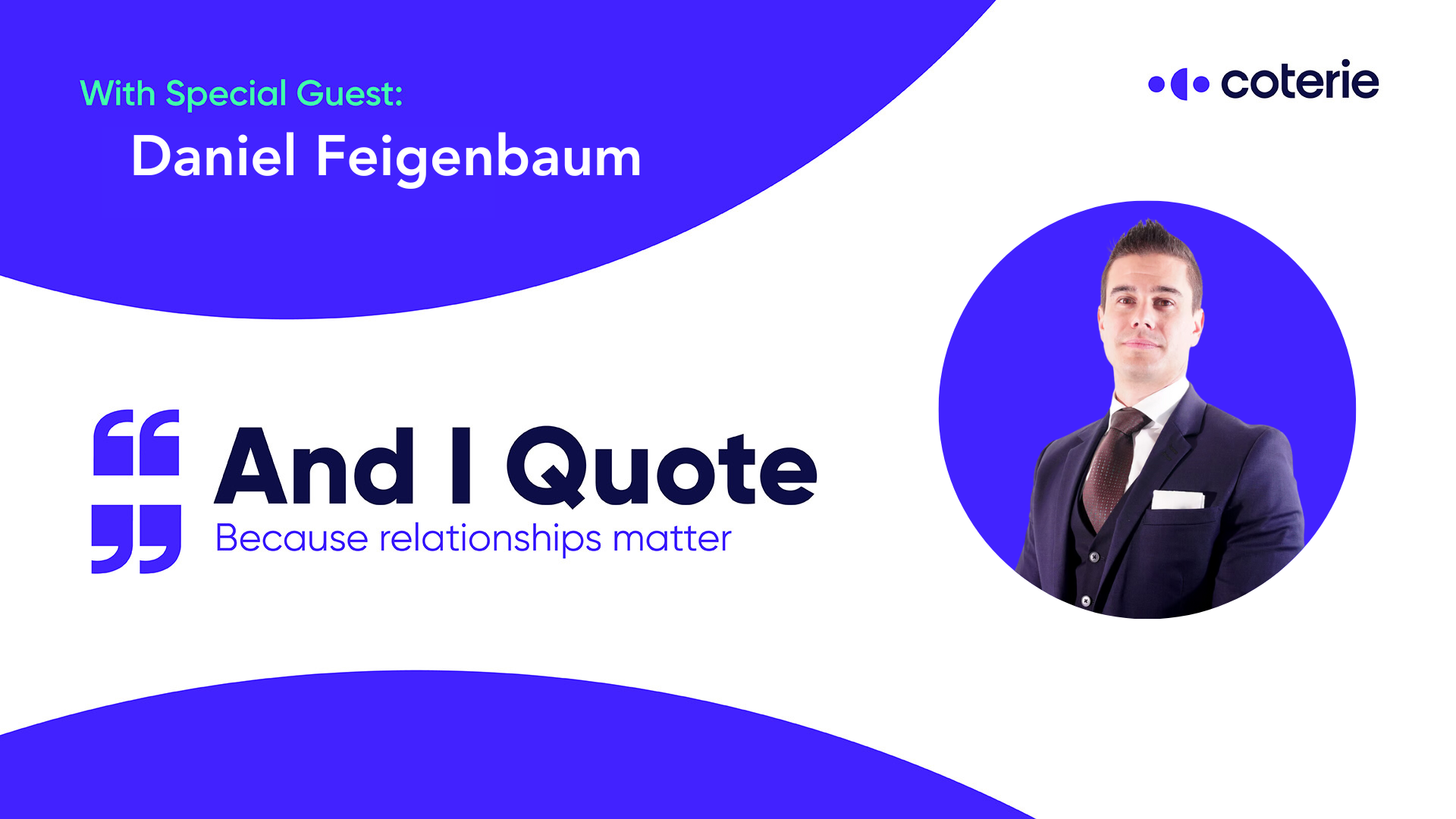Small business insurance may seem like a complex and confusing product, but it’s often a necessity. Understanding how to buy small business insurance may simplify the process for you, helping you spend less time looking for coverage and more time running your business with the protection you need to stay in business.
As a small business owner, few could blame you for putting off purchasing small business insurance. At first, buying a business insurance policy may seem a daunting task, especially considering how needlessly complex the process often appears.
Fortunately, companies like Coterie are making it easier and simpler to buy small business insurance. Learning about the purchasing process can help you make an informed decision about the coverages you need to adequately protect your business — and all your hard work — from the dangers and perils that threaten it.
Quoting and initial underwriting
Applying for insurance is the first step to purchasing a policy. Filling out an application gives insurance companies an idea about what your business is and does in a process called underwriting.
Underwriting determines if your business represents an “acceptable risk” that fits into the insurance company’s risk appetite — how willing they are to insure businesses of a given type or in a given industry.
For example, certain industries may be considered too high-risk for an insurer’s appetite. If a given insurer is more accustomed to or set up for servicing mechanics, plumbers, and retailers, it may choose not to write a policy for an off-shore drilling company.
During the initial underwriting phase, your business is grouped with similar businesses through classification. Classification splits risks among like businesses based on shared qualities — the type of work you do, the size of your business, where and how you operate, and your experience and claims history.
If your business is considered an acceptable risk, the insurance company uses your information and classification to provide you with a quote — how much you need to pay to put the policy into place and keep it in force.
However, receiving a quote is just the beginning of the underwriting process.
What is underwriting?
Underwriting is split into two parts:
Initial underwriting takes place during the application and quoting process. During this phase, insurers filter out businesses that don’t meet their risk appetite and offer a quote to businesses that fit their risk tolerance.
Final underwriting begins after purchasing a policy. During final underwriting, your application is reviewed and follow-up questions are resolved before your policy is finalized and approved.
Purchasing and binding small business insurance
Binding an insurance policy is a means by which you’re temporarily covered by the policy on the day of its effective date. In other words, a bound policy means you have the requested insurance coverage, even as your application continues through the underwriting process.
Once your policy is bound (which may be as early as the moment you paid for the policy), an insurance binder is sent to you with documents that outline your coverage and coverage limits via mail, email, or other methods.
Certificates of insurance are also sent to you and all appropriate parties and may be used as proof of coverage for anyone who requests it.
After the insurance company completes its underwriting process, your policy either becomes finalized and approved or is rejected.
Policy renewal and auditing
A small business insurance policy is in force for a defined length of time, called a term or policy period. Terms usually last for 12 months: If you purchase a policy on April 1, 2021, the policy would remain in effect until April 1, 2022 (unless canceled).
During your policy term, your rate and coverages remain constant unless you make changes to the policy, such as increasing a coverage limit or adding a policy endorsement. If you don’t make changes to the policy, you’ll have the same coverage and pay the same rate for each month of the policy period.
Policies are typically set up to renew automatically, provided the first payment on the new term is made. However, before the end of the term, your insurance company may perform an audit of your business and policy to ensure you have adequate insurance coverage.
When your policy renews, your rate will reflect the results of any requested changes made to the policy, if any.
Filing claims
When you purchase small business insurance, your insurance company promises to pay you if a covered event takes place. This is accomplished through a legal requirement called indemnity, in which the insurance company is obligated to make your business whole again in exchange for your premiums.
The concept of indemnity may also expand to protection from legal liability for claims made against your business. In other words, your small business insurance coverage may pay for the cost of defending your business from litigation, including the cost of court fees, attorney fees, and any potential settlement or judgment, potentially saving your business upwards of millions of dollars.
But before they’re able to, you need to file a claim. The claims process begins when you contact your insurance company to report a loss, such as vandalism or an accident. In turn, your insurer’s claims division or claims administrator launches an investigation to determine if and how much the insurance company must pay (up to your policy’s limits).
Indemnity requires that you don’t benefit from, nor be harmed by, insurance. Instead, the goal is to restore your business to the way it was before the event took place. In other words, you’re not going to get rich off of an insurance claim: You’re going to get enough money to get things back to normal.
If a power outage caused inventory spoilage and you’re insured against such a risk, your policy would compensate you for the cost of the ruined inventory, up to your policy’s limits. You wouldn’t receive more than the inventory was worth, nor would you receive less (unless the cost of the loss exceeded your coverage limit or you weren’t adequately insured).
The claims process may seem overwhelming at first, but it doesn’t have to be. Work with your claims adjuster to provide them with any requested information so they can accomplish their responsibility: Making your business whole again.
What should I look for in an insurance company?
No two insurance companies are exactly alike. Even if two or more insurers offer the same products, they’re likely to differ in the quality of their products, how they support their customers, and the ease with which you can purchase and manage your policies.
Finding the best small business insurance company to suit your needs may take some time, but it’s usually worth the effort and peace-of-mind in knowing you’re purchasing coverage from a company you can trust to be there for you when you need them most.
Quality of coverage
Your primary goal should be finding a policy that meets your coverage needs. After all, what good is an insurance policy if it still leaves you exposed to the everyday risks that threaten your business?
Don’t worry if you don’t fully understand what your insurance needs are, either. Insurance companies you consider working with should be able to provide honest help and advice to assist you in discovering your needs and finding proper coverages.
When comparing policies from different insurers, be mindful that you’re comparing apples to apples: The coverages and limits in policy A should be the same as those in policy B, with cost the only difference.
Remember, too, that cost isn’t always the defining factor. Some insurers may slash coverage to offer a lower rate than a competitor. In the short-term, your wallet may thank you, but underinsuring your business may lead to costly ramifications down the line.
Quality of the company
Insurance companies make promises to the people and businesses they cover. Any insurance company you give your money and business to should be willing to come to your aid at the time you need them most — following a covered loss.
Even looking past an insurer’s legal obligation to pay out following a covered loss, it’s simply good business. Chances are you’d do everything in your power to take care of your customers and clients; your insurance company should be willing to do the same for you.
Research customer reviews and testimonials to discern what past and current customers think of the insurer you’re considering. Analyze your interactions with any agents or representatives you’ve spoken to: Did they seem honest? Considerate? Helpful?
Consider the financial strength of a potential insurance company, too. A company backed by high-rated insurers and reinsurers (or that is high-rated itself) means rating agencies have confidence in the ability of the company to pay its policyholders’ claims.
Customer service
Insurance is a complex product with many nuances and conditionals. Unless you’re an insurance salesperson yourself — or enjoy reading about insurance for fun — you can’t be blamed if you don’t fully understand every aspect of your insurance policy, needs, or coverage.
Whichever insurance company you choose should fit the role of a partner. As a partner, your insurance company should share its support for your business and your continued success and well-being.
As such, customer service should be able, happy, and willing to guide you through your policy, assist you with any insurance concerns, and otherwise ensure all of your needs are being met to the best of the insurer’s ability.
Ease of use and experience
The time you spend thinking of your insurance needs and poring over your policy takes away from the time you spend running your business. Though it’s important to do your due diligence and frequently assess your needs, you shouldn’t be on your own to figure out what’s what.
The right small business insurance company for you understands that you’re an expert in whatever it is you do. As a result, they should refrain from making insurance needlessly complex. Instead, they should be quick to answer your questions, offer solutions to your problems, and provide immediate access to your policy documents (which can, in turn, be used to demonstrate proof of insurance for any clients that demand it).
How Coterie helps you buy small business insurance
Gone are the days of lengthy insurance applications and processes. Coterie makes it fast and easy to request a small business insurance quote and be covered in under five minutes – through agents & brokers, through Coterie’s partners, and through the Coterie website.
In fact, quoting and binding a policy with Coterie is near-instantaneous: Small business insurance can be purchased in realtime to provide immediate, same-day coverage.
Additionally, Coterie’s policies are backed by great customer service representatives that understand the various and complex aspects of insurance and who genuinely care about protecting your business.
How you buy insurance is entirely up to you, too. Though it’s possible to buy and bind a policy through Coterie without ever speaking to another human being, our licensed insurance agents are available if you need them, however you need them — through a phone call, online chat, or email — and are glad to walk you through the process or answer any questions you may have.





